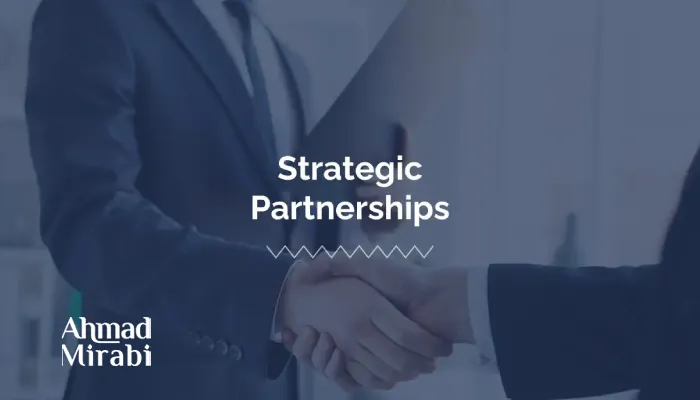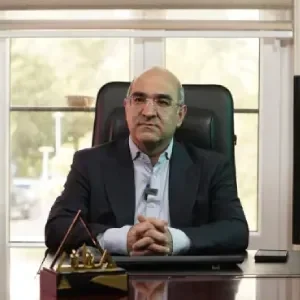Why Strategic Partnerships Are the Key to Thriving in Iran
In Iran, strategic partnerships are not just a growth lever—they are often the difference between success and failure. Unlike transactional markets where contractual clarity drives business, Iran thrives on relational trust, cultural compatibility, and long-term engagement. From navigating complex regulations to accessing local supply chains and government support, strategic alliances are the foundation of sustainable market presence.
Dr. Ahmad Mirabi, a top Iranian business strategist with over two decades of hands-on advisory to foreign firms, puts it succinctly:
“In Iran, the market opens for those who are not just present—but embedded. Partnerships are how you embed.”
This article explores the anatomy of successful partnerships in Iran—blending legal, cultural, and behavioral strategies to help foreign entities build alliances that last.
-
Understand the Strategic Role of Partnerships in Iran’s Ecosystem
In many sectors of the Iranian economy—energy, pharmaceuticals, fintech, manufacturing—foreign direct ownership is restricted or politically sensitive. Even where legally allowed, operating solo often invites friction with regulators or local competitors.
Strategic partnerships offer:
- Access to distribution channels
- Faster government approvals
- Shared local knowledge and networks
- Increased legitimacy with stakeholders
But to succeed, foreign investors must adopt a partnership mindset—seeing Iranian counterparts not as subcontractors or intermediaries, but as co-creators of value in a high-context, relational economy.
Dr. Mirabi notes:
“Don’t just bring capital or technology. Bring listening. Iranian businesses value respect and reciprocity more than aggressive scaling.”
-
Types of Partnerships That Work Best in Iran
The most effective partnership structures vary by industry and business model, but common formats include:
| Type | Description |
| Joint Ventures | Shared equity and control, often with a registered local entity |
| Local Distributors | Widely used in FMCG, pharmaceuticals, tech; needs robust monitoring |
| Franchise Models | Increasingly accepted in retail, F&B, education |
| Strategic Alliances | Non-equity collaborations around R&D, supply chains, or marketing |
| Government Affiliation | In state-dominated sectors like energy and transport, local-state ties help |
Each of these requires tailored legal contracts, cultural alignment, and clear role definition. The ideal partner not only knows the regulatory terrain but has soft influence in local ecosystems.
-
Cultural Compatibility: The Foundation of Sustainable Collaboration
Iranian business culture is nuanced and rooted in deep interpersonal trust. Some key cultural principles foreign partners must embrace:
- Tarof (Politeness Ritual): Knowing when to insist vs. accept can change negotiation outcomes.
- Personal relationships over institutional processes: The first deal often depends on who introduces you, not just your proposal.
- Long-termism: Partnerships are expected to last; opportunistic behavior can irreparably damage reputation.
Dr. Mirabi’s insight:
“Cultural compatibility isn’t a soft skill—it’s a strategic asset. Many Western companies fail by underestimating this dimension.”
Building real rapport may involve:
- Frequent in-person visits
- Respecting religious and national holidays
- Investing time in social rituals (meals, gifting, hospitality)
Using Persian-speaking representatives, even if contracts are in English
Legal and Regulatory Considerations for Foreign Partnerships
Though Iran’s Foreign Investment Promotion and Protection Act (FIPPA) allows foreign investment, not all partnerships are equal in the eyes of the law.
Key regulatory points:
- FIPPA registration gives repatriation and protection benefits—but only with approval from OIETAI.
- Some sectors (e.g. telecom, oil) require government authorization or majority local shareholding.
- Contractual agreements should include clear IP rights, dispute resolution mechanisms, and governance models.
Foreign firms should work with bilingual legal experts to:
- Draft contracts that align with Iranian Commercial and Civil Codes
- Address profit distribution, IP usage, and exit strategies
- Leverage government channels (e.g., Chamber of Commerce) to validate agreements
-
How to Find the Right Strategic Partner in Iran
Finding the right partner isn’t about casting a wide net—it’s about finding the right fit. Dr. Mirabi advises a multi-stage process:
Industry Scouting:
Identify sector players through exhibitions, trade chambers, and platforms like IranTrade or TPO.
Cultural Vetting:
Analyze alignment in values, ethics, business styles, and strategic vision.
Legal & Financial Due Diligence:
Verify company registrations, ownership structure, pending litigation, and credit history.
Pilot Engagement:
Test with a limited-scope project before formalizing long-term contracts.
Tip: Engage third-party advisors like Dr. Mirabi’s office to conduct cross-cultural and commercial validation.
. Real-World Case: How a European Tech Firm Scaled via Local Partnership
In 2022, a mid-sized German industrial automation company partnered with a niche Iranian engineering firm. The foreign company brought product innovation and capital, while the Iranian partner provided:
- Regulatory facilitation
- Localization of tech manuals and user interfaces
- Access to energy sector clients
Despite initial mistrust, the two parties co-developed a hybrid sales model. Within 18 months, they secured government contracts and launched a local R&D center.
What worked:
- Bilingual, culturally-aware communication
- Trust-building travel and team exchanges
- Flexible partnership terms allowing joint problem-solving
Dr. Mirabi was an advisor to this engagement and highlights:
“They didn’t just enter Iran. They adapted, listened, and evolved. That’s why they won.”
Common Mistakes to Avoid in Iranian Partnerships
| Mistake | Why It Fails in Iran |
| Over-contractualization | Misses relational dynamics; creates rigidity |
| Ignoring cultural advisors | Leads to misinterpretation of signals and behaviors |
| One-size-fits-all contracts | Lacks sensitivity to local laws and expectations |
| Aggressive negotiation styles | Perceived as disrespect; erodes trust |
| No local conflict resolution planning | Leads to gridlock when problems arise |
Instead, foreign firms should:
- Focus on mutual value creation, not just legal protection
- Co-create solutions with partners rather than dictate terms
- Maintain flexibility for evolving market conditions
-
Role of Branding in Partnership Success
Your brand positioning affects how potential partners perceive you. In Iran, a foreign company with a strong digital identity, localized communication, and visible thought leadership is more likely to attract high-quality partners.
Elements that matter:
- Persian-translated website with culturally relevant messaging
- Professional presence on platforms like LinkedIn and Aparat
- Participation in Iranian exhibitions or virtual webinars
Dr. Mirabi’s firm offers branding consultations tailored to Iran’s unique market psyche. As he says:
“Partnerships don’t just happen behind closed doors—they begin with how you’re seen in public.”
For more, see: Branding and Business Development Consulting
. The Hidden Role of Informal Networks and Influence in Business Success
While foreign investors often focus on formal registrations, licenses, and corporate governance, seasoned Iranian entrepreneurs know that informal networks (“Shabakeh-ha”) are the true enablers of progress. These networks—based on alumni ties, religious affiliations, industry circles, and even regional loyalties—often play a crucial role in approvals, introductions, and momentum.
Ignoring this layer of Iranian business culture can lead to:
- Delayed access to key decision-makers
- Missed partnership opportunities
- Being perceived as disconnected from “how things work here”
Unlike corruption-prone systems, Iran’s informal networks are not always financial in nature—they are often based on trust, credibility, and social capital. Building this capital takes time and presence, not just emails or legal paperwork.
Dr. Mirabi explains:
“Formal approvals open the front door; informal trust opens the real doors. That’s how successful companies scale in Iran.”
How to engage these networks effectively:
- Attend local business events and roundtables
- Partner with insiders or advisors who already have network capital
- Avoid transactional approaches—build relationships with sincerity
For foreign firms, leveraging informal influence through ethical, informed advisors can accelerate market traction while staying legally compliant.
-
How Behavioral Economics Shapes Partnerships in Iran
Successful partnerships in Iran are not just a function of legal alignment—they are deeply affected by human behavior, perception, and social psychology. Iranian decision-makers, like their counterparts elsewhere, are not purely rational actors. However, their behavioral drivers differ due to cultural, historical, and emotional dimensions of doing business in a high-uncertainty economy.
Key behavioral traits to understand:
- Loss aversion: Iranian partners may avoid risk even in high-reward scenarios, especially during times of political or economic volatility.
- Social proof: Endorsements from mutual contacts or government-related actors hold more weight than brochures or slide decks.
- Reciprocity norm: Generosity in the early stages of partnership often fosters long-term loyalty.
Dr. Mirabi incorporates behavioral economics into every partnership strategy:
“Don’t just bring value—signal trustworthiness, create micro-wins, and understand emotional risk perception.”
Behaviorally intelligent partnership-building might include:
- Designing flexible revenue-sharing models
- Offering training or resources before expecting results
- Creating shared wins (like local job creation) that appeal beyond financial ROI
By understanding behavioral tendencies unique to the Iranian market, foreign firms can structure partnerships that not only look good on paper—but feel right in practice.
Scaling a Pilot Partnership into a National Market Presence
Establishing a partnership is just the first step; scaling it strategically across Iran’s diverse regions and regulatory landscapes requires planning, agility, and resource allocation.
Iran is not a homogenous market. Each province may have:
- Unique industrial priorities (e.g., energy in Khuzestan, tourism in Mazandaran)
- Different levels of bureaucratic agility
- Distinct consumer behaviors and brand affinities
A successful pilot project in Tehran, for instance, might struggle in Isfahan or Shiraz unless localized properly.
To scale effectively:
- Build modular contracts that allow adaptation across geographies
- Train your local partner’s teams using standardized but culturally-adjusted content
- Invest in local marketing—not just in Farsi, but tailored to provincial sentiments
Dr. Mirabi recommends a 3-stage scale-up model:
Pilot in a central market
Optimize operations and cultural alignment
Expand regionally with brand positioning calibrated to local tastes
Scaling also means knowing when to renegotiate, when to reinvest, and when to pause. Iran’s market rewards patience, but only if growth is managed wisely.
This is where having a long-term strategy partner—not just an operational one—can make or break your national ambitions.
Conclusion: Partnerships Are the Real Market Entry Strategy
Entering Iran without a local partner is not just hard—it’s strategically unwise. But the right partnership, built on respect, cultural fluency, legal clarity, and shared goals, can unlock sustainable success.Iran rewards those who play the long game—and in that game, strategic partnerships are your best move.
Start Building Smarter Partnerships in Iran
Ready to explore opportunities in Iran’s dynamic business landscape?
Looking for vetted partners, legal structure advice, and cultural intelligence?
Book a strategy call with Dr. Ahmad Mirabi
Learn more about business consulting for foreign investors



